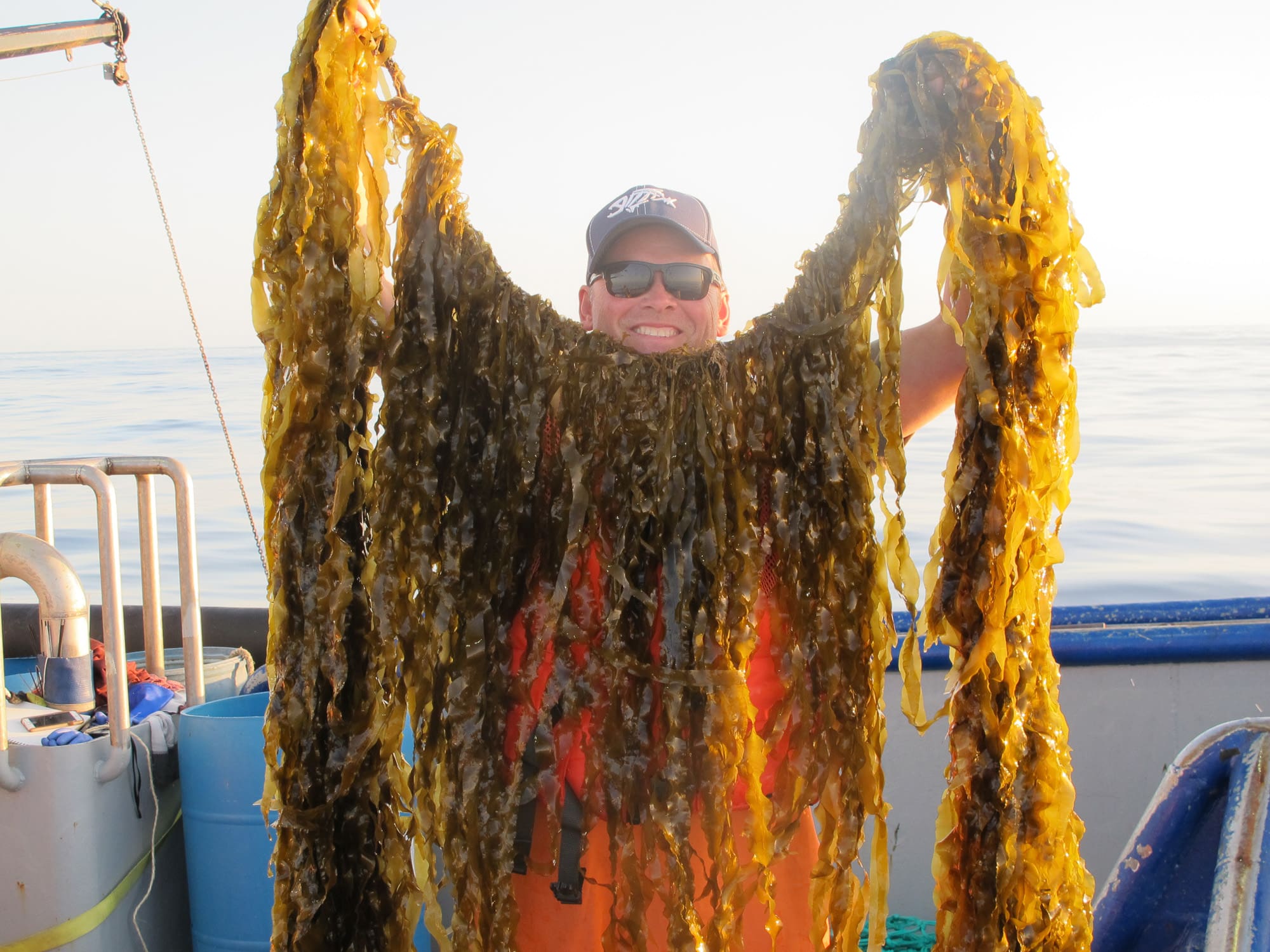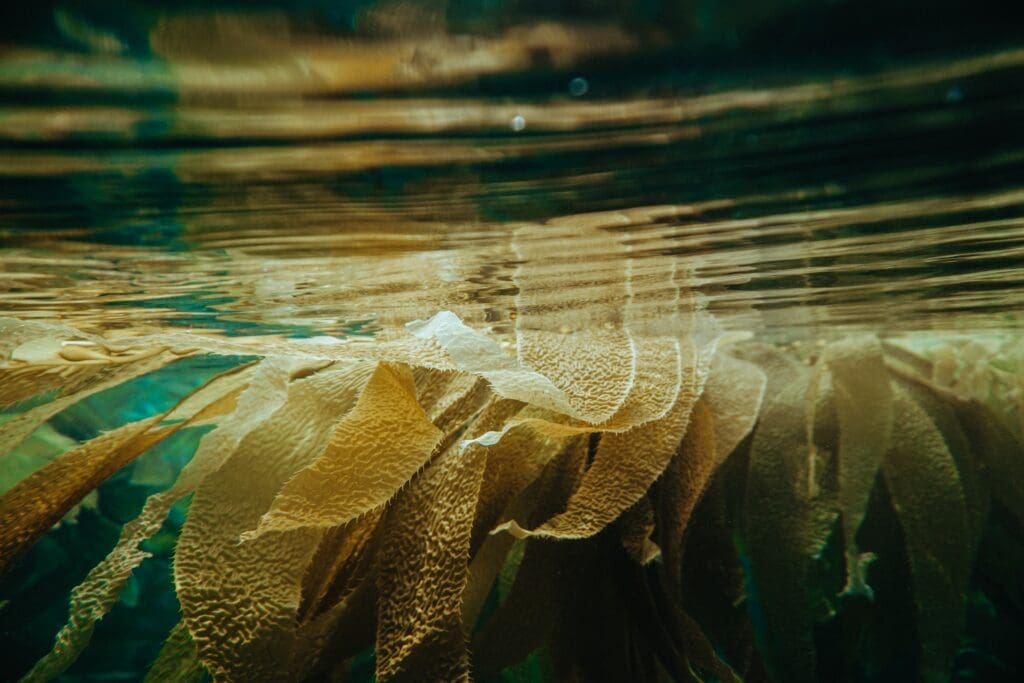Running Tide
Advise And Evaluate Ocean-Based Carbon Dioxide Clean Up Initiatives
Overview
Given the ocean’s size, biological productivity, and capacity to sequester and safely store carbon dioxide, it may be able to play a leading role in cleaning up the legacy of carbon dioxide pollution in the air and water. Ocean-based carbon dioxide removal (CDR) technologies remain much less developed than land-based alternatives, but there are a number of promising approaches—including the use of large-scale macroalgae (seaweed) cultivation for carbon clean-up.
Through a partnership with the Jeremy and Hannelore Grantham Environmental Trust, Ocean Visions is helping to identify and evaluate ocean-based carbon dioxide removal innovations, providing third-party advice and assistance on research, development, field testing, impact analysis, and optimization.
Under this partnership, Ocean Visions has assembled a team of experts to advise and evaluate a research project being conducted by Running Tide Technologies, Inc.
Update: As of February 2022, The evaluation and advising period has closed. Ocean Visions is now working with Running Tide in a different capacity as part of our Launchpad Program.

Running Tide Technologies, Inc.
Running Tide Technologies, Inc. is a company specializing in scalable aquaculture solutions. In 2021, Running Tide is conducting a field trial of a technology designed to grow seaweeds (macroalgae) with the intent of sequestering carbon. This field trial will determine the efficacy and impacts of a proprietary system of open ocean kelp farming for carbon sequestration. An Ocean Visions’ Expert Team is providing external, third-party review of Running Tide’s research plans and all findings that come from the field trial.


Research Plan
Following an initial convening in January 2021, Running Tide Technologies, Inc. (“Running Tide”) and Ocean Visions formulated a research plan describing areas of joint engagement.
Progress Reports
Progress reports from Ocean Visions advisors will describe progress on mutually agreed-upon areas of collaboration.
Advisory Team Bios
Jim Barry
a Senior Scientist and Chair of the Research Division at the Monterey Bay Aquarium Research Institute (MBARI) is a marine ecologist whose research focuses on the consequences of climate-related changes in ocean conditions, including ocean acidification, warming, and reduced oxygen levels for marine organisms and ecosystems. Jim’s research spans topics from the ecology of rocky shores to deep-sea corals and sponges, and from California shores to the coastal waters of Antarctica. Dr Barry has published over 150 scientific papers, and has helped inform the public and policy-makers on ocean acidification, ocean carbon sequestration, and climate change by speaking at congressional hearings, briefings, and meetings with members of Congress.
Tom Bell
is an ecosystem ecologist at the Earth Research Institute at UC Santa Barbara who studies the dynamics of coastal foundation species (kelps, seagrasses, corals) over large space and time scales. Specifically, he uses a combination of field and laboratory studies, statistical and mechanistic models, and satellite/aerial remote sensing to understand how the abundance and physiology of coastal foundation species, and their associated ecological communities, are spatially structured by environmental dynamics and biotic interactions. He has authored over 30 peer-reviewed publications and has also been developing aerial and underwater imaging techniques to quantify the growth, biomass, and tissue content qualities of kelp grown on offshore aquaculture farms.
Annalisa Bracco
is a professor in the School of Earth and Atmospheric Sciences at Georgia Tech. She is a physical oceanographer and her group research focuses on understanding the role of the ocean circulation in transporting and mixing physical and biogeochemical tracers. She is interested in linking physical processes to climate variability, biodiversity, and evolution by combining basic and applied sciences with innovative modeling tools, data mining, and dynamical systems theory. She has authored over 80 peer-reviewed publications and received the AMS 2011 Nicholas Fofonoff Award for contributions to understanding mesoscale ocean dynamics, geostrophic turbulence, and tropical dynamics, and their coupling with marine ecosystems.
Wil Burns
is a Visiting Professor, Environmental Policy & Culture program at Northwestern University. He is also a Senior Research Fellow for the Centre for International Governance Innovation (CIGI), and Co-Chair of the International Environmental Law Committee of the American Branch of the International Law Association. He has published over 80 articles and chapters in law, science, and policy journals and books, and has co-edited four books. He holds a Ph.D. in International Environmental Law from the University of Wales-Cardiff School of Law. His current areas of research focus are climate geoengineering, climate loss and damage, and the effectiveness of the European Union’s Emissions Trading System.
Alex Rogers
is a marine ecologist who is interested in how biodiversity is distributed in the ocean, especially in the deep sea and on tropical coral reefs. He is also interested in human impacts on the ocean and how to manage human activities to mitigate or reduce degradation of marine ecosystems. His work has taken him to the Atlantic, Indian and Southern Oceans, and to the Caribbean investigating coral reef ecosystems, seamounts, and deep-sea hydrothermal vents. Alex has worked with governments, intergovernmental, and non-governmental organisations in publicising human impacts, especially those from deep-sea fishing and climate change, and on the development of policy solutions to such problems. He is Scientific Director of REV Ocean a foundation aimed at finding solutions to problems affecting the ocean as well as Visiting Professor, Department of Zoology, and Senior Research Fellow, Somerville College, University of Oxford.